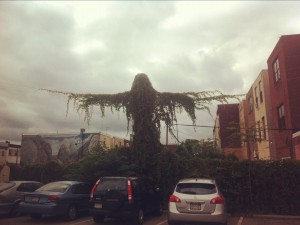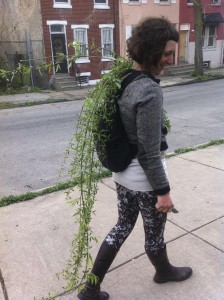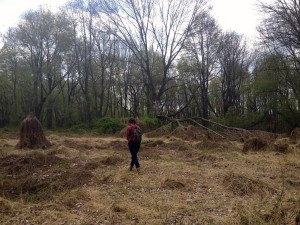By LandLab Resident Artists WE THE WEEDS, Kaitlin Pomerantz and Zya S. Levy
 Look up on any summer day and your eyes are bound to come into contact with climbing, clambering vines. Clinging to treetops and fences, tumbling across buildings, these robust and intrepid climbers adventure always upwards, using structures natural and manmade to achieve great heights and lengths.
Look up on any summer day and your eyes are bound to come into contact with climbing, clambering vines. Clinging to treetops and fences, tumbling across buildings, these robust and intrepid climbers adventure always upwards, using structures natural and manmade to achieve great heights and lengths.
On the Schuylkill Center premises alone there are dozens of vine varieties. Natives include moonseed, wild yam, grape, green briar, and poison ivy. Even more abundant are the invasives: oriental bittersweet, mile-a-minute, Japanese honeysuckle, porcelain berry, and wisteria. Where did these travelers come from? What are they doing here? What can be done about, or better yet, with them?
Our botanical arts collaboration, WE THE WEEDS (comprised of botanist Zya S. Levy and artist Kaitlin Pomerantz), will explore the answers to these questions during our summer-fall LandLab residency. We have begun identifying local vines, and our next step will be to research the histories of their global transmigrations– where they came from, how they got here, and why they are thriving. Later in the summer, we will harvest numerous invasive vines for use in a woven sculpture that communicates our findings. Our installation will be a visual interpretation of the complex and interwoven migratory trajectories of these trailing plants.
 The relationship between vines and humans extends far beyond Tarzan – throughout history humans have used vines as building, binding, food, and medicinal materials (and much more), and vines have used humans (or human structures, rather) to reach astounding new heights. Really, unlike many plants that have been displaced by the growth of human industry, vines thrive on it– winding over human infrastructure to advance their main biological imperative: to spend minimal energy investing in support tissue so as to spend more energy on reaching sunlight. More infrastructure for vines means faster-growing, more abundant vines! Beyond this, many invasive vine species thrive in disturbed, even toxic soils– indicating that human pollution may be encouraging the propagation of invasives. This complicated, yet fascinating, relationship, antipathy, and perhaps symbiosis, is what we wish to look into more closely through our research. We believe that a better understanding of how and why foreign vines got here and how we may have been involved, could lead to more fruitful interpretations for how to manage, and appreciate, these most scandalous, scandent plants.
The relationship between vines and humans extends far beyond Tarzan – throughout history humans have used vines as building, binding, food, and medicinal materials (and much more), and vines have used humans (or human structures, rather) to reach astounding new heights. Really, unlike many plants that have been displaced by the growth of human industry, vines thrive on it– winding over human infrastructure to advance their main biological imperative: to spend minimal energy investing in support tissue so as to spend more energy on reaching sunlight. More infrastructure for vines means faster-growing, more abundant vines! Beyond this, many invasive vine species thrive in disturbed, even toxic soils– indicating that human pollution may be encouraging the propagation of invasives. This complicated, yet fascinating, relationship, antipathy, and perhaps symbiosis, is what we wish to look into more closely through our research. We believe that a better understanding of how and why foreign vines got here and how we may have been involved, could lead to more fruitful interpretations for how to manage, and appreciate, these most scandalous, scandent plants.
Want to get involved?
Join WE THE WEEDS for a hands-on vine identification and harvesting workshop on Saturday, July 12 from 10 am to 12 pm, highlighting the characteristics, uses, and lore surrounding different local and invasive vines on the SCEE premises. Please wear sturdy shoes and protective clothing.
WE THE WEEDS is a botanical arts and outreach initiative aimed at raising awareness about urban ecology, headed by artist Kaitlin Pomerantz and botanist Zya Levy. Past projects include ethnobotanical tours, art installations, plant identification workshops and visualizations, culinary and sensory plant experiences, participatory science experiments, school and public outreach— all aimed at highlighting the presence of the natural world within the manmade landscape, and illuminating the uses, historical and cultural significances of spontaneous wild urban flora.
Kaitlin Pomerantz is a Philadelphia artist whose practice spans a variety of media and materials to explore the relationship between art and sustainability. She has worked in farming, aquaculture (oyster farming) and Quaker and urban education. Her most recent projects were completed with the support of the Philadelphia Mural Arts Program and RAIR – Recycled Artist in Residency.
Zya S. Levy, a field botanist with the USDA, has over ten years of experience working with flora of North America. In love with plants since her earliest recollection, she is inspired by the resiliency and beauty of nature within the city ecosystem. Zya is the founder of the Collecting Collective and the Philadelphia Investigative Institute of the Wild which hosts plant walks, identification workshops, botanical cocktail parties, urban research projects, and herbal study groups.

